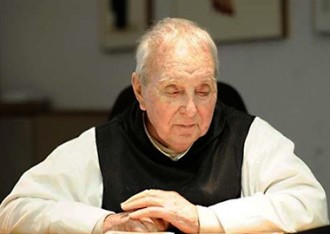
Paul Schrader’s “First Reformed” Depicts Death Struggle Between Hope and Despair
Warning: numerous spoilers ahead. “Who will release me from the body of this death?” This…
Read More
Warning: numerous spoilers ahead. “Who will release me from the body of this death?” This…
Read More
“People always leaving just as other folks arrive.” That is the line that suddenly came to mind when I learned that Father Matthew Kelty left this world peacefully at noon on Friday last. This is a great loss to those of us newly, and not-so-newly, arrived, and I wanted to try to explain why I think this is so. This remarkable monk spent fifty off-and-on years at the Abbey of Gethsemani in Kentucky, where he was the last confessor that Thomas Merton ever had; and if that wasn’t enough to warrant further discussion, he was also a gay priest who came out in one of his most eloquent essays at the ripe old age of ninety. We will not soon see the likes of such monks again.
Read More
Thursday morning a dozen occupiers addressed forty or so clergy. We clergy were all somewhat skeptical of the demand for public space. You could hear the ministerial, rabbinical hrumph, hrumph in the room. (Most of us had never occupied Zucotti Park and a downward trend in temperature wasn’t going to improve on that.) But the occupiers edged toward the theological as they articulated a need for communal, inspirational, face-to-face contact in which they could “appear” to one another.
Read MoreThis revised chronology makes his story even more moving, and far more brave.
Read More
Both in the first wave of press in 2002 about abuse in the Catholic Church and now during this second wave, we’ve talked very little about girls, and even less about stalking and the other kinds of abuse that people in power, in particular religious authorities, enact on the unsuspecting and the young. While we have a lot of journalists covering the scandal and talking to victims, we have very little in the way of “personal narrative” of what this experience is like. I hope my novel, This Gorgeous Game, and its protagonist’s first-person voice will offer a new perspective on the conversation.
Read More
Since the fall of Secularization Theory, which claimed that belief in God would slowly recede in the face of science and technology, we still must ask: Is there a future for formal, organized, institutionalized religion as we presently recognize it in rapidly globalizing, postindustrial and postmodern world? Here’s what religion will have to do for humans to survive and flourish.
Read More